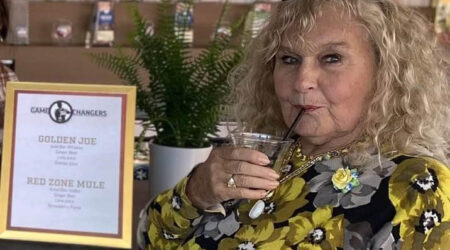Gerda’s Letter: Words That Would Mend War’s Wounds
On July 6 in 1945, a 21-year-old Jewish refugee named Gerda Weissmann wrote a letter to a young American officer she had met two months earlier when his unit liberated her and more than 100 other women along the border between Germany and Czechoslovakia. The horrors of World War II were finally ending in Europe. If […]
On July 6 in 1945, a 21-year-old Jewish refugee named Gerda Weissmann wrote a letter to a young American officer she had met two months earlier when his unit liberated her and more than 100 other women along the border between Germany and Czechoslovakia. The horrors of World War II were finally ending in Europe. If the fighting had lasted even another day or two, this emaciated young woman – she weighed less than 70 pounds – would have perished. But Gerda Weissmann survived the war, the only member of her family to do so. Then she thrived, first in a converted U.S. military hospital in Volary, Czechoslovakia, and later in western New York, which became her home.
Gerda knew nothing of this future as she wrote a letter, in the German language, to the soldier the other girls in the ward teasingly called ‘’Gerda’s lieutenant.’’ His actual name was Kurt Klein, and he was an intelligence officer with the 2nd Regiment of the U. S. Army’s 5th Infantry Division.
Lt. Klein, who had turned 25 years old days before, had left Gerda a single rose before his unit was ordered into nearby Bavaria. In her July 6, 1945 letter, Gerda told Kurt that as part of her physical rehabilitation she had tried her hand at jewelry-making. Her first effort as an artisan, she wrote, was ‘’a tiny star meant for you.’’
Whether this was a six-sided Star of David or a five-sided star inspired by the white insignia of the U. S. Army that Gerda saw on the jeeps and tanks that rescued her, I do not know.
But I do know something about the ensuing life story of Gerda Weissmann, whom I had dinner with several years ago. It is well worth sharing.
* * *
Of all the senseless cruelties that epitomized the Second World War – and there were millions of them – the forced marches of prisoners from concentration camps in Poland in the war’s waning days are among the most depraved and maddening.
As the Red Army closed in on them from the east, SS units and labor camp commandants fled toward the German interior. But inexplicably, they forced their half-starving, barely clad prisoners to march with them. And so it was that Gerda Weissmann, who had been hauled away to the camps in 1939 at age 15 for the crime of being Jewish, found herself five-and-a-half years later among 1,350 women and girls on a forced march to nowhere, in the middle of winter, in what became known as the Volary Death March.
Along the way, SS guards starved and beat the prisoners – and shot them when they straggled or tried to run away or simply got sick.
This final torture lasted 106 days and nights, and covered some 550 miles. By the last days of this horror, Germany had already fallen, which the guards knew. The sadistic commander in charge ignored orders from Heinrich Himmler himself to stop killing the prisoners, and took to back roads to avoid both Czech townspeople who wanted to feed the girls and American military units fanning through the countryside.
Finally, in the first week of May, as U.S. pilots began strafing any uniformed Germans still marching under arms, the SS guards melted away into the forest, leaving Gerda and the other surviving prisoners locked inside a shack at an abandoned bicycle factory.
When the 5th Army arrived in Volary on May 5, 1945, townspeople told them about the prisoners. Of the original 1,350 girls and women, some 116 were still alive when the American soldiers liberated them. White-haired and skeletal, they looked to the Americans to be elderly.
Actually, most of them were much younger. Gerda Weissmann was two days’ shy of her 21st birthday.
Kurt Klein and another soldier were among the first two Americans to approach the prisoners. Kurt asked Gerda a question in both English and in German. Knowing no English, she responded in German. So he spoke to her in that language, but with a tone she hadn’t heard in many years.
‘’Don’t cry, my child,’’ he told her. ‘’It is all over now.’’
Klein and his American comrades looked to Gerda ‘’like gods’’ as she struggled to absorb a seeming miracle: that these brave, able, confident, well-fed and well-armed – and kind-hearted –Americans had crossed the ocean and a continent to fight for her freedom.
The young lieutenant asked her another question: ‘’May I see the other ladies?’’
After six years of being demeaned and brutalized, the word ‘’ladies’’ caught Gerda by surprise.
‘’We are Jews,’’ she said in a small voice.
‘’So am I,’’ replied Kurt Klein.
The young lieutenant was wearing sunglasses, so Gerda couldn’t see whether he had tears in his eyes when he made this statement, but she thought she heard a catch in his voice.
She was right about that: Kurt Klein and his older sister and brother were born in Germany and sent to the United States to live with relatives after Kristallnacht convinced their parents that it was time for Jews to escape. But the Klein parents never made it out in time and were murdered in the death camps, as were Gerda’s parents and brother, and Kurt was thinking of his own family as he attended to these abused, resilient refugees.
There would be time for Gerda and Kurt to discuss all that later, just as there would be time for Kurt to come courting in the hospital and give Gerda a first kiss and propose marriage and take her back to Buffalo and raise their children together.
All that, and much more, would unfold in the fullness of time in the life Gerda Weissmann Klein. In a 2011 White House ceremony, Barack Obama would drape the Presidential Medal of Freedom around her neck and praise her for reminding us all that ‘’it is often in our most hopeless moments that we discover the extent of our strength and the depth of our love.’’
But on a beautiful spring morning 71 years ago, there was only time to be admitted into the German military hospital that the Americans had converted into a medical facility to treat death march survivors.
‘’Won’t you come with me?’’ Kurt asked as he opened the door for Gerda. Although she was almost too weak and overcome by what had happened to walk another step, that gallant gesture of holding the door helped Gerda summon her courage and her hope – and do just that.
Carl M. Cannon is the Washington Bureau Chief for RealClearPolitics. Reach him on Twitter @CarlCannon.
Carl M. Cannon





